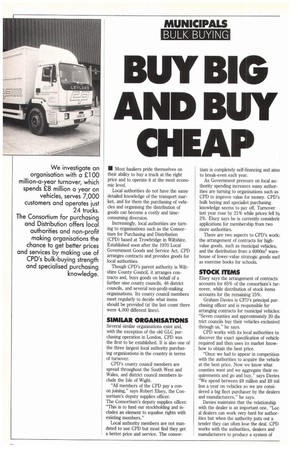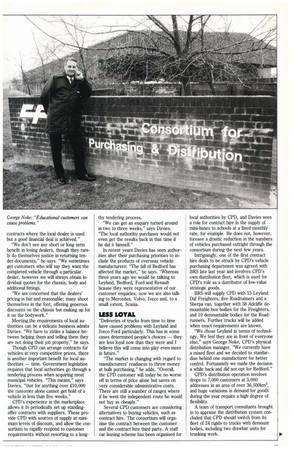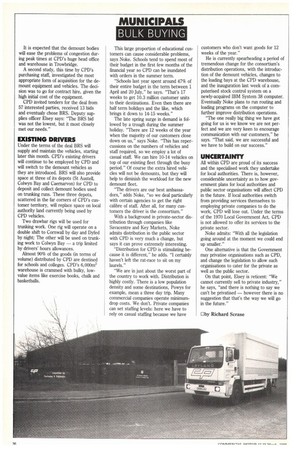BUY BIG AND BUY CHEAP
Page 36

Page 37

Page 38

If you've noticed an error in this article please click here to report it so we can fix it.
• Most hauliers pride themselves on their ability to buy a truck at the right price and to operate it at the most economic level.
Local authorities do not have the same detailed knowledge of the transport market, and for them the purchasing of vehicles and organising the distribution of goods can become a costly and timeconsuming diversion.
Increasingly, local authorities are turning to organisations such as the Consortium for Purchasing and Distribution (CPD) based at Trowbridge in Wiltshire. Established soon after the 1970 Local Government Goods and Service Act, CPD arranges contracts and provides goods for local authorities.
Though CPD's parent authority is Wiltshire County Council, it arranges contracts and, buys goods on behalf of a further nine county councils, 46 district councils, and several non-profit-making organisations. Its county council members meet regularly to decide what items should be provided (at the last count there were 4,000 different lines).
SIMILAR ORGANISATIONS
Several similar organisations exist and, with the exception of the old GLC purchasing operation in London, CPD was the first to be established. It is also one of the three largest local authority purchasing organisations in the country in terms of turnover.
CPD's county council members are spread throughout the South West and Wales, and district council members include the Isle of Wight.
"All members of the CPD pay a conon joining," says Robert Elsey, the Consortium's deputy supplies officer. The Consortium's deputy supplies officer. "This is to fund our stockholding and includes an element to equalise rights with existing members."
Local authority members are not mandated to use CPD but most find they get a better price and service. The consor
tium is completely self-financing and aims to break-even each year.
As Government pressure on local authority spending increases many authorities are turning to organisations such as CPD to improve value for money. CPD's bulk buying and specialist purchasing knowledge seems to pay off. Turnover last year rose by 21% while prices fell by 2%. Elsey says he is currently considerir applications for membership from two more authorities.
There are two aspects to CPD's work: the arrangement of contracts for highvalue goods, such as municipal vehicles, and the distribution from a 6000m2 warehouse of lower-value strategic goods sucl as exercise books for schools.
STOCK ITEMS
Elsey says the arrangement of contracts accounts for 85% of the consortium's turnover, while distribution of stock items accounts for the remaining 15%.
Graham Davies is CPD's principal purchasing officer and is responsible for arranging contracts for municipal vehicles: "Seven counties and approximately 20 dis trict councils buy their vehicles exclusivel through us," he says.
CPD works with its local authorities to discover the exact specification of vehicle required and then uses its market knowhow to obtain the best price.
"Once we had to appear in competition with the authorities to acquire the vehicle at the best price. Now we know what counties want and we aggregate their requirements and go and buy," says Davies "We spend between 28 million and 29 mil lion a year on vehicles so we are considered a big fleet purchaser by the dealers and manufacturers," he says.
Davies maintains that the relationship with the dealer is an important one. "Loc. al dealers can work very hard for authorities but when the authority puts out a tender they can often lose the deal. CPD works with the authorities, dealers and manufacturers to produce a system of contracts where the local dealer is used but a good financial deal is achieved."
"We don't see any short or long term benefit in losing dealers, though they rarely do themselves justice in returning tender documents," he says. "We sometimes get customers who will say they want the completed vehicle through a particular dealer, however we will always obtain individual quotes for the chassis, body and additional fittings.
"We are concerned that the dealers' pricing is fair and reasonable; many shoot themselves in the foot, offering generous discounts on the chassis but making up for it on the bodywork."
Meeting the requirements of local authorities can be a delicate business admits Davies: "We have to strike a balance between helping them and telling them they are not doing their job properly," he says.
Though CPD can arrange contracts for vehicles at very competitive prices, there is another important benefit for local authorities — time. Government legislation requires that local authorities go through a tendering process when acquiring most municipal vehicles. "This means," says Davies, "that for anything over £10,000 the customer alone cannot get hold of a vehicle in less than five weeks."
CPD's experience in the marketplace allows it to periodically set up standingoffer contracts with suppliers. These provide CPD with sources of supply at minimum levels of discount, and allow the consortium to rapidly respond to customer requirements without resorting to a leng thy tendering process.
"We can get an enquiry turned around in two to three weeks," says Davies. "The local authority purchaser would not even get the results back in that time if he did it himself."
In recent years Davies has seen authorities alter their purchasing priorities to include the products of overseas vehicle manufacturers: "The fall of Bedford has affected the market," he says. "Whereas three years ago we would be talking to Leyland, Bedford, Ford and Renault bcause they were representative of our customer enquiries, now we are also talking to Mercedes, Volvo, Iveco and, to a small extent, Scania.
LESS LOYAL
"Deliveries of trucks from time to time have caused problems with Leyland and Iveco Ford particularly. This has in some cases determined people's choices — they are less loyal now than they were and I believe this will come into play even more in future."
"The market is changing with regard to manufacturers' readiness to throw money at bulk purchasing," he adds. "Overall, the CPD customer will today be no worse off in terms of price alone but saves on very considerable administrative costs. There are still a number of ranges where if he went the independent route he would not buy as cheaply."
Several CPD customers are considering alternatives to buying vehicles, such as contract hire. The consortium will organise the contract between the customer and the contract hire third party. A staff car leasing scheme has been organised for local authorities by CPD, and Davies sees a role for contract hire in the supply of mini-buses to schools at a fixed monthly rate, for example. He does not, however, foresee a drastic reduction in the numbers of vehicles purchased outright through the consortium during the next few years.
Intriguingly, one of the first contract hire deals to be struck by CPD's vehicle purchasing department was agreed with BRS late last year and involves CPD's own distribution fleet, which is used for CPD's role as a distributor of low-value strategic goods.
BRS will supply CPO with 15 Leyland Daf Freighters, five Roadrunners and a Sherpa van, together with 38 Adcliffe demountable box bodies for the Freighters, and 10 demountable bodies for the Roadrunners. Further trucks will be added when exact requirements are known.
"We chose Leyland in terms of technology. We feel they are in front of everyone else," says George Noke, CPD's physical distribution manager. "We currently have a mixed fleet and we decided to standardise behind one manufacturer for better control. Fortunately we made the decision a while back and did not opt for Bedford."
CPD's distribution operation involves drops to 7,000 customers at 5,000 addresses in an area of over 36,50011:m2, and huge variations in demand for goods during the year require a high degree of flexibility.
A team of transport consultants brought in to appraise the distribution system concluded that CPD should switch from its fleet of 24 rigids to trucks with demount bodies, including two drawbar units for trunking work. It is expected that the demount bodies will ease the problems of congestion during peak times at CPD's huge head office and warehouse in Trowbridge.
A second study, this time by CPD's purchasing staff, investigated the most appropriate form of acquisition for the demount equipment and vehicles. The decision was to go for contract hire, given the high initial cost of the equipment.
CPD invited tenders for the deal from 57 interested parties, received 13 bids and eventualy chose BRS. Deputy supplies officer Elsey says: "The BRS bid was not the lowest, but it most closely met our needs."
EXISTING DRIVERS
Under the terms of the deal BRS will supply and maintain the vehicles, starting later this month. CPU's existing drivers will continue to be employed by CPD and will switch to the demount vehicles as they are introduced. BRS will also provide space at three of its depots (St Austell, Colwyn Bay and Caernarvon) for CPD to deposit and collect demount bodies used on trunking runs. These three depots, scattered in the far corners of CPD's customer territory, will replace space on local authority land currently being used by CPD vehicles.
Two drawbar rigs will be used for trunking work. One rig will operate on a double shift to Cornwall by day and Dyfed by night; The other will be used on trunking work to Colwyn Bay — a trip limited by drivers' hours allowances.
Almost 90% of the goods (in terms of volume) distributed by CPD are destined for schools and colleges. CPD's 6,000m2 warehouse is crammed with bulky, lowvalue items like exercise books, chalk and basketballs. This large proportion of educational customers can cause considerable problems, says Noke. Schools tend to spend most of their budget in the first few months of the financial year so CPD can be inundated with orders in the summer term.
"Schools last year spent around 47% of their entire budget in the term between 1 April and 20 July," he says. "That's 17 weeks to get 10.3 million customer units to their destinations. Even then there are half term holidays and the like, which brings it down to 14-15 weeks."
The late spring surge in demand is followed by a trough during the summer holiday. "There are 12 weeks of the year when the majority of our customers close down on us," says Noke. "This has repercussions on the numbers of vehicles and staff required, so we employ a lot of casual staff. We can hire 10-14 vehicles on top of our existing fleet through the busy period." Of course the extra hired vehicles will not be demounts, but they will help to diminish the workload for the new demount fleet.
"The drivers are our best ambassadors," adds Noke, "so we deal particularly with certain agencies to get the right calibre of staff. After all, for many customers the driver is the consortium."
With a background in private-sector distribution through companies like Savacentre and Key Markets, Noke admits distribution in the public sector with CPD is very much a change, but says it can prove extremely interesting.
"Distribution for CPD is stimulating because it is different," he adds. "I certainly haven't left the rat-race to sit on my laurels."
"We are in just about the worst part of the country to work with. Distribution is highly costly. There is a low population density and some destinations, Powys for example, mean a three day trip. Many commercial companies operate minimumdrop costs. We don't. Private companies can set staffing levels: here we have to rely on casual staffing because we have customers who don't want goods for 12 weeks of the year."
He is currently spearheading a period of tremendous change for the consortium's distribution operations, with the introduction of the demount vehicles, changes to the loading bays at the CPD warehouse, and the inauguration last week of a computerised stock control system on a newly-acquired IBM System 38 computer. Eventually Noke plans to run routing and loading programs on the computer to further improve distribution operations.
"The one really big thing we have got going for us is we know we are not perfect and we are very keen to encourage communication with our customers," he says. "That said, we are successful and we have to build on our success."
UNCERTAINTY
All within CPD are proud of its success and the specialised work they undertake for local authorities. There is, however, considerable uncertainty as to how government plans for local authorities and public sector organisations will affect CPD in the future. If local authorities switch from providing services themselves to employing private companies to do the work, CPD will lose out. Under the terms of the 1970 Local Government Act, CPD is not allowed to offer its services to the private sector.
Noke admits: "With all the legislation going around at the moment we could end up smaller."
One alternative is that the Government may privatise organisations such as CPD, and change the legislation to allow such organisations to cater for the private as well as the public sector.
On that point, Elsey is reticent: "We cannot currently sell to private industry," he says, "and there is nothing to say we can't be privatised — however there is no suggestion that that's the way we will go in the future."
Oby Richard Scrase
































































































